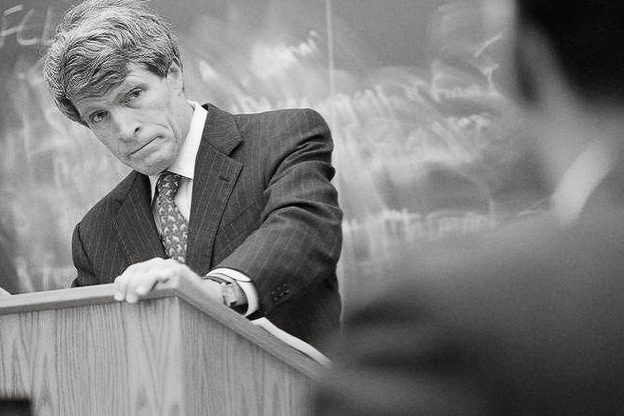

I Wish I Didn’t Have to Vote for Richard Painter—But I Do
A guest editorial by Mark Osler
In more normal times, I am the kind of voter who would happily vote for Tina Smith in the Democratic primary. I’m a lifelong Democrat, and respect those who have paid their dues and worked hard in often thankless jobs, as Smith has done. I also agree with her on most issues, and when other things are equal I am inclined to vote for women, since they are still sorely under-represented in many parts of government.
But these are not normal times. I will not be voting for Tina Smith, because there is a better candidate amid the startling political reality of this moment. Richard Painter may be sharp in opinion, a Republican until very recently, and running against the wishes of DFL leadership, but he has something Smith lacks, even as his policy positions largely track those of Smith on many important issues: an unparalleled expertise in an area that will shape future debates, and a media platform that ensures that Minnesota’s voice will be heard.
Even given former Senator Al Franken’s decision to retire in the wake of allegations of sexual misconduct, the consensus seems to be that Franken was an effective representative for this state up to that point. He brought a sharp moral edge to many encounters; for example, his questioning of some Trump appointees became legendary. There was a memorable moment in his dialogue with Secretary of Education appointee Betsy DeVos, in which Franken brought out DeVos’s failure to grasp fundamental terms used in education policy. [And recall Franken’s successful examination of Jeff Sessions to elicit the admission he had met with Russian officials. ed.] That exchange not only brought an important fact to the surface, but became an enduring image in the public imagination. These two things—making important points, and creating enduring images—are related. If nothing else, we learned that from both Ronald Reagan and Barack Obama. Politicians who can do that are simply more effective.
Let’s face it, though: While educational policy is and will be important, it will not likely be the defining issue during the rest of the Trump presidency. That issue, the one that will matter most, is governmental ethics. And that, my friends, is what Richard Painter knows best. If he is in the Senate, he will be at the center of that debate.
Of course, even if he is not in the Senate, Painter will likely be at the center of that debate, because news sources routinely seek him out as an expert. So why should Minnesotans care? The answer lies in the subtle way that power can work in the United States Senate.
With the kind of exposure Painter will get as an expert comes a certain additional leverage to get the things we need and want in Minnesota. Whom do you want to speak at your fundraiser? Maybe Dan Sullivan? Or Steve Daines? Jack Reed, maybe? They are all U.S. Senators, after all (from Alaska, Montana, and Rhode Island, respectively).
If you are a Democrat, you probably want Elizabeth Warren, actually. And Warren is the member of the Senate whose profile comes closest to Painter’s in an important sense. Before being elected to the Senate, Warren was best known as a crusading law professor who was an expert on a hot topic (consumer protection). Like Painter, she was well known as a sharp, articulate, experienced academic who taught at several schools with an interlude in public service. Also like Painter, she was a Republican for much of her adult life– she became a Democrat only in her mid-40’s– drawn by the Republican belief in markets.
You want someone to speak convincingly about the problems of a given organization? Ask someone who has quit. That’s Elizabeth Warren. It is also Richard Painter.
There’s no doubt that Richard Painter is not a company man. We professors tend to be like that. He bugs the hell out of the DFL leadership. [And the Republicans even more. ed.] But his views on the issues that matter most are consistent with most of us on the Democratic side, and he has that something extra—he is an expert on something that is extremely important right now, and will be into the foreseeable future. Minnesota needs him, and so does this country.
Mark Osler is the Robert and Marion Short Professor of Law at the University of St. Thomas, and the author of Contemporary Criminal Law (West, 2018).
Thanks for your feedback. If we like what you have to say, it may appear in a future post of reader reactions.

